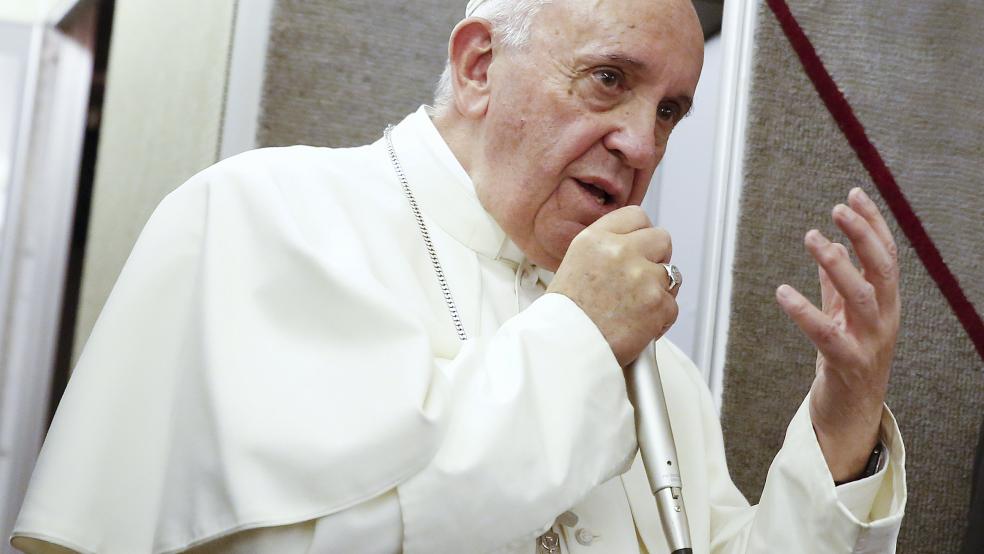In an historic speech to Congress on Thursday, Pope Francis solidified his role as not only a religious leader, but as a commanding moral presence.
In a nearly hour-long address to a joint meeting of Congress, Francis tackled several provocative, partisan issues that have divided Democrats and Republicans for years, if not decades, including immigration, abortion, the death penalty, climate change and military efforts against extremists.
Related: The Humble Pope’s Costly U.S. Visit – and How He Can Pay It Back
While the head of the Catholic Church mostly made universal, bipartisan recommendations, both parties no doubt will soon try to claim victory that their policies received a Papal seal of approval. One can just imagine the words of His Holiness being quoted by both parties in the looming government shutdown fight over funding for Planned Parenthood and on the presidential campaign trail.
Before making various strategic, carefully-worded calls to action, His Holiness exhorted lawmakers to remember the tremendous responsibility they have been given by the voting public.
“You are called to defend and preserve the dignity of your fellow citizens in the tireless and demanding pursuit of the common good, for this is the chief aim of all politics,” Francis told the audience, which featured several 2016 presidential hopefuls. “Legislative activity is always based on care for the people.”
He invoked President Abraham Lincoln in urging Congress to strike a “delicate balance" in fighting religious extremism without sacrificing personal freedoms.
“We know that in the attempt to be freed of the enemy without, we can be tempted to feed the enemy within,” Francis warned as Vice President Joe Biden and Republican House Speaker John Boehner (R-OH) sat directly behind him.
Related: Pope Francis: Another Outsider Challenges the Status Quo
Noting he himself is the “son of immigrants,” the Pope asked lawmakers not to “turn their backs on their neighbors,” whether they be immigrants come across the U.S. southern border illegally or are part of the human exodus flowing from Syria.
"On this continent, too, thousands of persons are led to travel north in search of a better life for themselves and for their loved ones, in search of greater opportunities," he said. “We must not be taken aback by their numbers, but rather view them as persons, seeing their faces and listening to their stories, trying to respond as best we can to their situation.”
He invoked The Golden Rule which “reminds us of our responsibility to protect and defend human life at every stage of its development,” a thinly-veiled reference to abortion that brought raucous applause and a standing ovation from GOP members.
The applause was short lived, as Pope Francis segued into using the same metric in calling for the abolition of the death penalty, this time rousing Democrats from their seats.
Related: From Bouncer to Pope—21 Fascinating Facts About Pope Francis
The partisan divide cropped up again when Francis brought up climate change. He cited heavily from his June encyclical on the topic and argued that lawmakers have a responsibility to help stop global warming, which he at one time described as “environmental deterioration caused by human activity.”
“I am convinced that we can make a difference and I have no doubt that the United States — and this Congress -- have an important role to play. Now is the time for courageous actions and strategies,” he said to prolonged applause by Democrats.
The Pope went on to denounce the global arms trade, saying it prevented any real chance for true “dialogue and peace” around the globe.
“Why are deadly weapons being sold to those who plan to inflict untold suffering on individuals and society? Sadly, the answer, as we all know, is simply for money: money that is drenched in blood, often innocent blood,” he said, putting lawmakers from both parties on edge as the U.S. is by far the largest arms supplied in the world.
Pope Francis closed his bipartisan sermon extolling the virtues of the family, which he said is “threatened, perhaps as never before, from within and without.”
Related: Pope Power—How Much Influence Does Francis Really Have?
“Fundamental relationships are being called into question, as is the very basis of marriage and the family,” he said, subtly reiterating his staunch belief in church social doctrine that marriage is a union between a man and a woman.
“I can only reiterate the importance and, above all, the richness and the beauty of family life,” he added while John Roberts, chief of the U.S. Supreme Court, which legalized same-sex marriage, listened from the first row.
The Pope said he hoped his remarks presented “some of the richness of your cultural heritage, of the spirit of the American people.”
“God bless America!” Pope Francis shouted at the end of his address.





